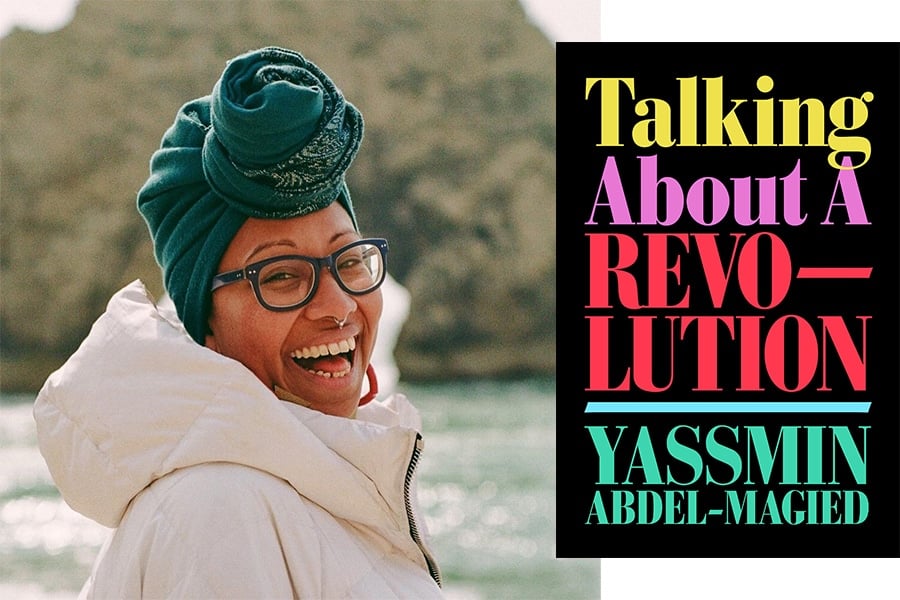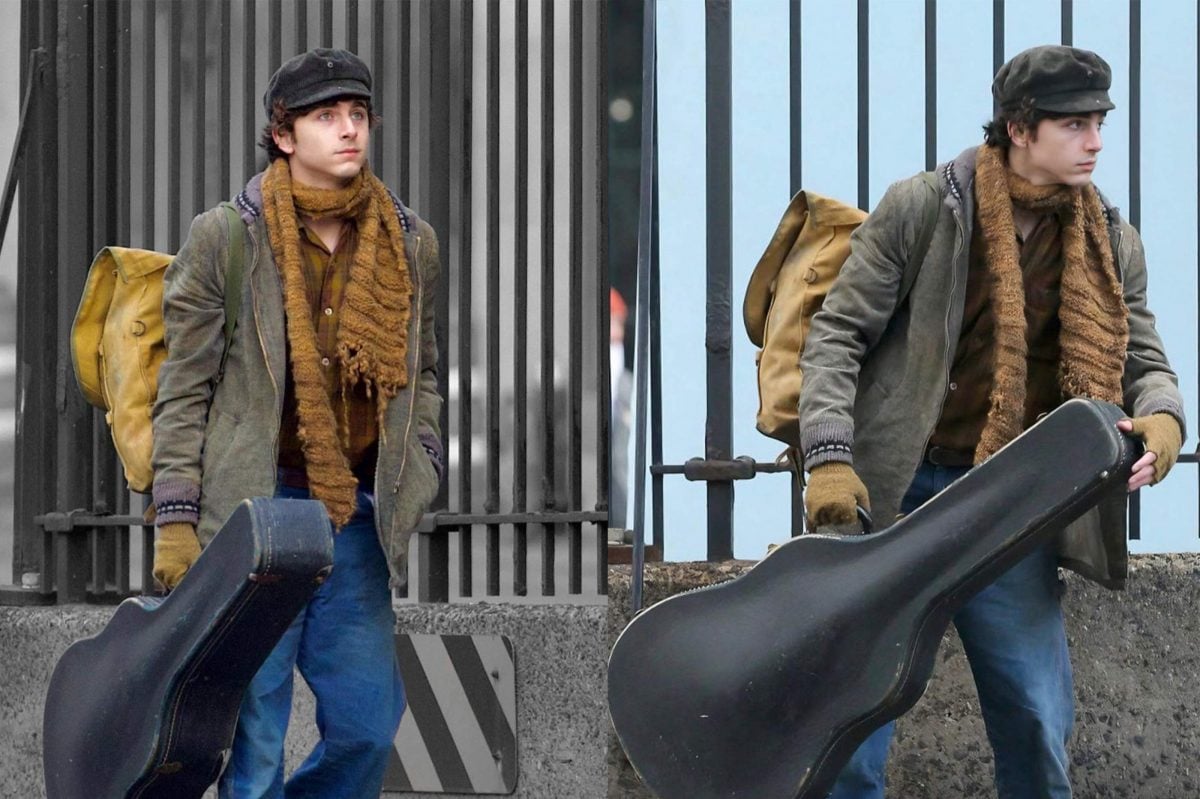
Yassmin Abdel-Magied sits outside any singular definition. The writer, engineer and advocate is a chameleon of sorts. With more than a decade spent in the public eye, she's moved through many different worlds; be it on the oil rigs in Queensland, sitting in on cryptocurrency meet-ups in London or delivering one of the most memorable TED Talks, asking audiences "what does my headscarf mean to you?"
Her new book of essays, Talking About A Revolution, covers this and much more. Set out in two parts, The Private Self and Public Self and Systems and Society, the book is a map of her politics and ways of thinking, charting how these have evolved over time and been shaped by public outrage, social movements, personal growth and words.
Following the release of Talking About A Revolution, RUSSH caught up with Yassmin Abdel-Magied, who spoke of her admiration for writer and organizer adrienne marie brown, learning to sew, drawing a line between her 20s and now, and the importance of not living "in the shadow of a narrative written by others". Find our conversation, below.
As someone who must contend with preconceived ideas about yourself all the time, what do you wish more people knew about you?
Somebody said to me recently after they met me that I was a lot more easy-going than they expected. It made me laugh, because I think people do have this impression that I'm quite an uncompromising, perhaps even judgmental person, whereas I think I am somebody who is very curious and very interested in other people’s perspectives. Yes, I have a strong voice and core strength but most of the time I just want to have a laugh – a respectful laugh – and learn from the world and absorb as much of life’s goodness as is possible…and I honestly love nothing more than a terrible pun!
How is your knitting going? Have you developed any other hobbies recently?
The knitting is going well! But I will be honest, because it's summer here in London I have put the needles aside for now and actually learned how to sew. I bought a cheap sewing machine some time during Covid-19 and I've been tailoring my clothes. Most recently I made a gorgeous linen summer dress from a zero waste pattern which has been delightful! I love making things. It’s been fascinating as well, sewing is quite a technically challenging skill, one with a lot of growth potential. You can start out with some really easy things, but there's just so much to learn and so much possibility…it’s been great!
Who is someone you admire for their pursuit of justice?
Gosh there are so many people! If I'm to think of who I really admire at this current moment, I would have to mention the writer and organizer adrienne marie brown, a really fascinating, thoughtful, considerate individual. They are on the ground organizing and facilitating but also being very transparent and honest about that process and really trying to be in community in ways that are truly just. They have been a wonderful teacher from afar.
I also have a friend named Rana Abdelhamid who works in New York City as a local organizer. Her run for Congress was recently thwarted by some pretty shady political machinations, but I've admired her work and energy for a really long time.
Patrick Lumumba is somebody I often think about as well. Lumumba was the Prime Minister of a newly independent Congo before he was killed, and I often wonder what life could have been like if he had continued to keep living… Even someone like John Garang, a South Sudanese politician who was a real peacemaker, who died under suspicious circumstances in 2005… what would the world have been like if these individuals had been allowed to see their dreams through? Justice is not an easy business.
You end part one of Talking About A Revolution with a poem called Sometimes I dream. Do you write poetry often?
Poetry is something that I have a really on and off relationship with. I do read poetry occasionally but I don't write it often. I’ll be honest, I was quite nervous about including the poem the book because I have many friends who are incredible poets and I find it quite an intimidating art form. I wasn’t sure I could pull it off, but including it in the collection was a bit of an experiment, a way to try something new, to stretch my boundaries. It was also about communicating a sense of feeling that perhaps wasn’t neatly encapsulated in essay form and I guess that is what poetry is about.
Resistance is at the heart of this book. From small acts like knitting as a hobby not as a side hustle to fantasies about giving up your Australian passport. How do you fill your cup to ensure you can continue?
Filling my cup comes from being with other people, people I love, or people who I have just met. I do get a lot from culture, from going to the theater, watching TV or reading books – I find something uniquely enriching about being immersed in the creative endeavors of others.
Movement is a big thing for me as well. The form of movement has changed over the years, but whether it's boxing, running, cycling or horse riding, bringing movement into my day always lifts it up.
Lastly, I do like to spend time by myself in nature. Not camping per se, sleeping bags are not really my vibe, but a week in a warm bed somewhere in the Scottish highlands, driving around gorgeous landscapes for hours on end, being in solitude and being reminded of one’s insignificance… truly invigorating!
The revolution will not be…
The revolution will not be just one person. The revolution is in us all, in solidarity, together.
Why did you decide to split Talking About A Revolution into two sections: The Private Self and Public Self, and Systems and Society?
I knew I needed to provide some sort of structure to the collection for it to make sense. Splitting it into effectively, the individual and the collective, made sense as I think they are both vital to the project of change. As much as I am obsessed with structural change it cannot happen on its own, and as much as it's vital for individuals to change themselves that also won't be enough for sustainable progress. Thus, revolution has to be at both the personal (which in today’s world, is so much about the self in the public realm) as well as the systems in society. Ultimately I guess, the structure reflects the way I think about change.
This collection of essays tracks the evolution of your ideas and ways of thinking. What’s it like seeing your work assembled in this way? Has it taught you anything?
In some ways it's quite confronting isn't it, to see all your work over almost a decade placed side by side? In a way it showed me that I had grown a lot, in my thinking and my craft, and perhaps the hard work had started to pay off. It also sharply demonstrated the evolution and development in my politics. I would like to believe my values have remained consistent but in some ways the way I understand the world, my place in the world and the way that I make sense of the world has evolved over the last decade. That was fascinating to observe, and I hope readers get a lot out of it as well.
Why was now the right time to speak about the waves of public trauma you experienced in Australia?
You know, I just felt it was the right time. I couldn’t tell you precisely why, but it probably helped that I could finally talk about my experiences without bursting into tears, or being immediately defensive and retraumatized. That was certainly a sign of progress, ha! I also really wanted to draw a line, you know? This is like, the coda to my 20s. It's a collection of my works from a wild decade of life. Putting the collection together I have found it frees me to then take the next step, to engage in the next chapter, to move forward.
It was time. Five years is a long time. It was time for me to write my own story and to not live in the shadow of a narrative written by others.
From a young age you’ve juggled multiple titles, worked across global communities, helmed social organisations, been stationed on oil rigs in Queensland – the list really is endless. What's the achievement you’re most proud of and why?
Honestly I find this question really tough! Partly because I don't think any one goal or achievement is a measure of my life… but I suppose something I am very proud of is continuing to grow and adapt and not let my life be one single story. I could have very easily for example, remained the CEO and chair of Youth Without Borders for years and had ‘founder of a youth org’ be my only life story. I could have stayed in Australia and been the ‘young woman who went through this horrific experience’ for the rest of my life. I could have been the young African Australian woman working on oil rigs and have that be my single story. But I feel so lucky to have had so many different tales, and the fact that I keep changing and evolving is something that is hard but I am proud of. I’ve moved cities, countries, lives – over and over and over again… and I’m thriving, by the grace of Allah. That's pretty cool, I think!
What are you looking forward to?
I guess I'm looking forward to the next chapter really! I’m 31 this year, and excited to be in a new decade of a whole bunch of different adventures, perhaps in many different locations? I'm also really curious to observe my own evolution as a writer. I'm taking the time now to focus on my craft and to focus on writing in a way that I didn't have the capacity or the opportunity to before, so I am really looking forward to finding out what the best version of a writer/storyteller I can be looks like. Who knows! Watch this space...
Yassmin Abdel-Magied's book Talking About a Revolution was published on May 31 and is available to order through Penguin or at your favourite book store.
Image: @yassmin_a



